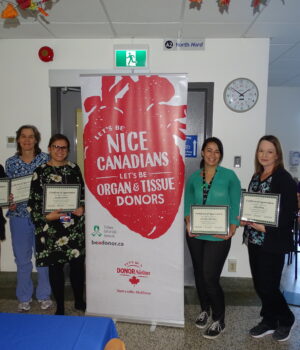
RENFREW COUNTY (Pembroke) — The Pembroke Regional Hospital has been recognized by the Trillium Gift of Life Network (TGLN), Ontario’s organ and tissue donation and transplantation agency, for its outstanding efforts to integrate organ and tissue donation into quality end-of-life care in 2018 and 2019.
At a special awards ceremony held earlier today, PRH was recognized as one of three hospitals in the province to receive the Provincial Routine Notification Rate Award for achieving a 100 per cent routine notification rate throughout 2018 and 2019. The routine notification rate is the percentage at which hospitals notify the Trillium Gift of Life Network when a patient has died and there may be the opportunity for organ and/or tissue donation.
“Receiving this award for the third year means a lot to our team and acknowledges our commitment to providing optimal end-of-life care for all patients and their families,” said PRH President and CEO Pierre Noel.
“Since joining the Trillium Gift of Life Network in 2013, our hospital reports every patient death so that TGLN’s specially trained staff can identify potential donors and approach families to get consent. In the past year alone, this has resulted in 13 tissue donors helping to enhance the lives of many.”
The Pembroke Regional Hospital is one of 30 hospitals and four community partners to be awarded a 2018 and 2019 Trillium Gift of Life Network Achievement Award.
“Pembroke Regional Hospital is an outstanding example of how applying leading donation practices can save lives,” says Ronnie Gavsie, President and CEO, Trillium Gift of Life Network. “The award is a reflection of the culture of donation established at PRH, and a reminder of the work that we still need to do in other communities across Ontario. We will not be complacent.”
In addition to the hospital’s award, seven PRH staff members were recognized for their individual contributions to the hospital’s organ and tissue donation program with Hidden Hero awards. The recipients were: Clinical Educator MJ Beier, Surgical Charge Nurse Connie Marquardt, Emergency Department/Intensive Care Unit Charge Nurse Jeris Johnston, Patient Flow Clinical Manager Annette Davidson, Registered Nurse Connie Chippure, Discharge Registered Nurses Kelly Malley and Karen Gauthier.
Today, more than 1.6 thousand people in Ontario are on the waitlist for a lifesaving organ transplant, and every three days someone will die without one. While the majority of Canadians support donation only 34 per cent of Ontarians have formally registered their consent for organ and tissue donation.
Some people believe that their age or medical condition prevents them from being a donor. In actuality, age does not preclude someone from becoming a donor, and each potential donor is assessed at the time of death for medical suitability. Others may not have registered under the misguided assumption that doctors won’t work hard to save a life if that patient is a registered donor, but in fact, the priority is always to save a life. Donation is only considered after all lifesaving efforts are exhausted, there is no chance of recovery, and the family accepts the diagnosis of death.






![Kenopic/Smith Auction [Paid Ad]](https://whitewaternews.ca/wp-content/uploads/2018/10/advertising-100x75.jpeg)

